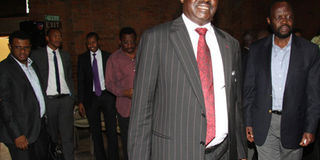Former leaders need to be active in politics

Former Prime Minister Raila Odinga arrives at Ufungamano Hall on December 11, 2014 for a press conference. It is unfortunate that Mr Odinga turned down the offer by the elders and political leaders of Homa Bay to succeed Otieno Kajwang’ as the local senator. PHOTO | JENNIFER MUIRURI |
What you need to know:
- Mr Odinga is an eminent political leader with substantial following and support in many parts of Kenya. His voice and views cannot be ignored in the national discourse.
- In progressive democracies such as Italy, all heads of state and eminent personalities are constitutionally appointed senators for life once their terms of office end.
- Kenya would have been the richer for having the former PM contribute to national discourse through a formal structure of governance such as the Senate.
It is unfortunate that former Prime Minister Raila Odinga turned down the offer by the elders and political leaders of Homa Bay to succeed Otieno Kajwang’ as the local senator.
I think it would have been far-sighted and good for Kenya if he had accepted the offer.
Mr Odinga is an eminent political leader with substantial following and support in many parts of Kenya. His voice and views cannot be ignored in the national discourse.
It is important to view his role holistically and not just through the lenses of the petty squabbles that characterise the relationship between the governing Jubilee and the opposition Cord.
In progressive democracies such as Italy, all heads of state and eminent personalities are constitutionally appointed senators for life once their terms of office end.
This ensures that the country is able to tap into the immense expertise, acumen, and socio-political influence these individuals enjoy.
NATIONAL COHESION
Closer home, in Burundi, all former heads of State are members of the state senate by law and right. Burundi enacted a progressive constitution after years of conflict to promote national cohesion and ensure that prominent leaders are not left out of the national discourse and healing process.
All former heads of state who serve in the senates of their countries are paid a pension. Imagine our Senate being patronised by the likes of former presidents Daniel arap Moi and Mwai Kibaki and Mr Odinga.
Obviously, this would enrich the stature of the Upper House and elevate debate above the petty dissonance we have been treated to between the Senate and the National Assembly.
The Constitution was enacted against the backdrop of the post-election violence that followed the 2007 General Election.
Civil society activists who pushed through the inclusion of many of the so-called progressive provisions of the Constitution did not think through the political ramifications of having a person who garners between 45 and 49 per cent of the electoral vote in a presidential election being locked out of national leadership and shut out of the formal legislative and executive process of governance.
This is what makes the competition for political power in Kenya such a perilous venture often tinged with negative ethnic overtones. It is the threat of marginalisation by dominant groups that often leads to such cutthroat competition and negative ethnicity as the primary basis for political mobilisation.
POSITIVE NATIONALISM
By shutting out political leaders with a large following such as Mr Odinga, our Constitution may have achieved the exact opposite aim of the efforts to engender national healing, inter-ethnic cohesion, and positive nationalism.
If the drafters of the 2010 Constitution had checked what countries emerging from violent conflicts or those marred with inter-ethnic strife do to accommodate everybody within the formal structure of governance in order to spur cohesion and nationalism, they would have avoided the situation in which Kenya finds itself today.
It would have been positive if Mr Odinga had accepted the offer to vie for the seat of Homa Bay senator and won it.
Kenya would have been the richer for having the former PM contribute to national discourse through a formal structure of governance such as the Senate.




